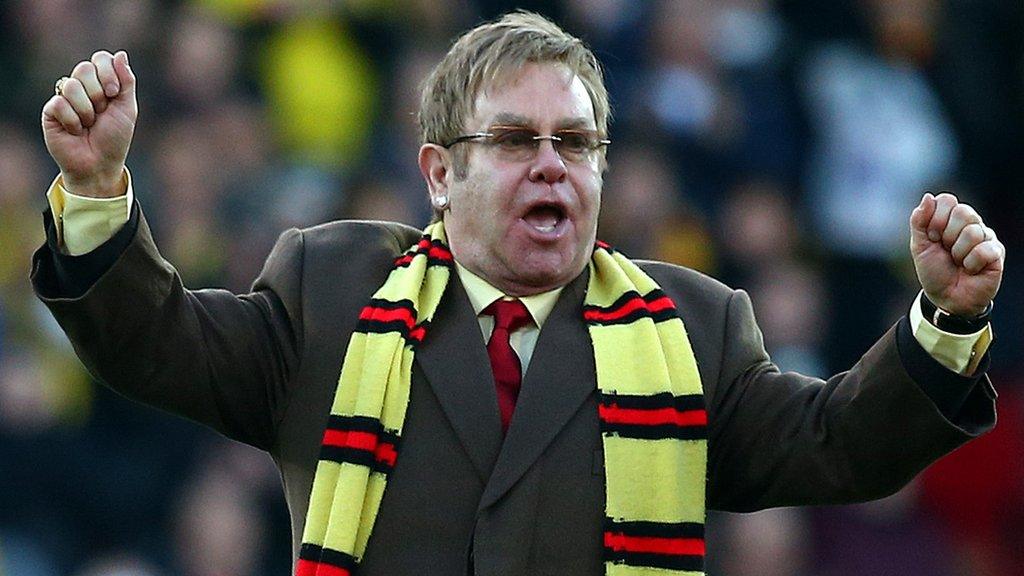Sir Elton John is more than a sport fan, he's a sports fund
- Published
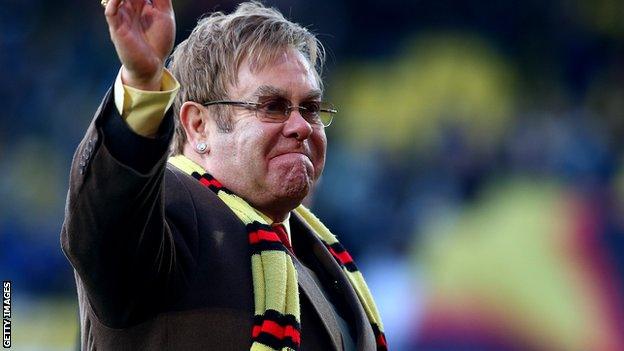
Sir Elton John has bought and sold Watford twice but remains his boyhood team's honorary life president
In the last few weeks, he has played tennis with Andre Agassi and Martina Navratilova in Las Vegas, led the cheers for F1 champion Lewis Hamilton in Texas and been on the phone to congratulate Watford striker Troy Deeney on his first Premier League goal.
It would be fair to say that Sir Elton John is a bit of a sports fan.
"I love all sports and would say I'm a huge sports fan," the 68-year-old pop legend told me in between calls from world leaders and leaders of the line.
"I follow the football, tennis, Olympic sports like cycling, cricket, athletics, rugby and pretty much any sport on the BBC Sport pages!"
But John's interest in sport goes far beyond the internet, the remote control or seats in Vicarage Road's Sir Elton John Stand.
Inspired by London 2012, John set up Rocket Sports Management , externalto "guide emerging sports stars through their careers, whatever the highs and lows".
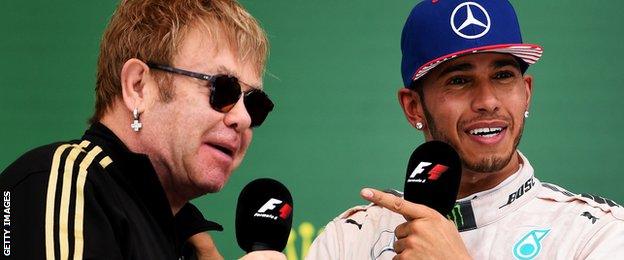
Elton's love of sport takes him to some strange places, including the US Grand Prix podium in Austin last month
Jason Kenny, Geraint Thomas and Laura Trott are among the leading cyclists on his books, and sprinter Richard Kilty and high jumper Isobel Pooley represent the world of athletics, but when John says "emerging sports stars" he really means it.
A long-term supporter of SportsAid, a national charity that has been helping aspiring athletes for nearly 40 years, John raised his game considerably when he put on a fund-raising show , externalfor the charity at Stoke Park Golf Club last summer.
The end product was £300,000 and the creation of the Elton John Sports Fund, a pot of cash to be shared among some of the most deserving young prospects across the 75 disciplines that SportsAid backs every year.
The pop prodigy, who had the first of his more than 50 global hits at 23, should be impressed with his first wave's progress, as three of the five selected in 2014 reached the final 10 of SportsAid's prestigious 2015 One-to-Watch Award,, external an annual competition that has been won in the past by diving's Tom Daley, heptathlete Morgan Lake and sprinter Jodie Williams.
The Elton-backed trio - sprinter James Arnott, triathlete Ben Dijkstra and tennis player Katie Swan - had spectacular years, particularly Arnott, who made the final three, but that does not mean the other two disappointed.
Rowing's Molly Harding won a silver medal in the women's quad at the Junior World Rowing Championships, and cyclist Fred Wright earned a bronze at the European Youth Olympic Festival. We are talking about some serious sporting talent here.
This year's winner, 16-year-old windsurfing wonder Emma Wilson, is a youth world champion already competing as a senior.
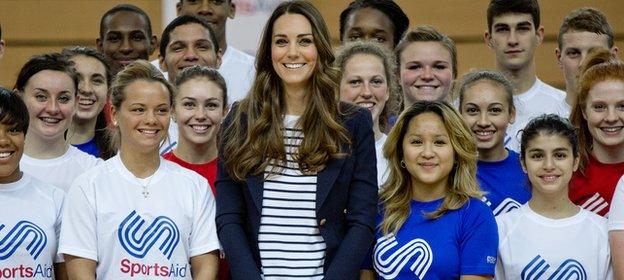
Founded in 1976, SportsAid has been dished out more than £50m to young athletes, a task helped by friends in high places
But we are also talking about teenagers; young athletes who have barely begun on the yellow brick road to stardom, let alone bid it farewell.
"I understand that it is vital for young people to get support and encouragement at this stage of their lives, especially when they have shown so much promise but face so many challenges and potential distractions," the Pinner-born, piano-playing philanthropist explained.
"We want to keep them in sport - they are fantastic role models and we should acknowledge this.
"Money is the biggest challenge these young athletes face - they receive no other income or support beyond their family and charities such as SportsAid, everything is done off their own back.
"Even when they pull on the GB vest at age-group level they are still paying for the privilege."
The impact of lottery funding on British sport is well documented: it has transformed our fortunes at Olympic and Paralympic level since 1996 and helped create a genuinely world-leading elite sports system.
But we also know we continue to lose talent before it reaches the level where lottery lolly kicks in. We also know that privately-educated athletes are disproportionately represented in our senior teams, and state-educated children often struggle to find good coaching, equipment and facilities.
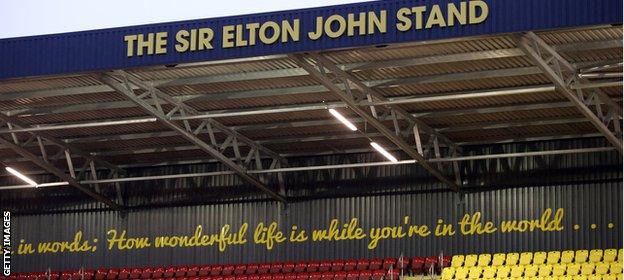
Elton bought a football club long before it was fashionable and is now part of the furniture at Vicarage Road
A SportsAid study published in 2012 found that the tier of British sporting talent just below full lottery support spends about £6,400 a year on their training.
Grants from the Elton John Sports Fund, which is now backing 20 athletes, are worth £2,000 a year, double the standard SportsAid cheque of £1,000.
And there is no doubt that this investment bears fruit: two thirds of Team GB's athletes at London 2012 were former recipients of this support, combining for 47 Olympic and Paralympic gold medals.
Arnott, an engaging 18-year-old, has used his award to help fund his costs at Oaklands College, the Hertfordshire-based further education college that he moved to from Devon to be closer to his training group.
That move paid off earlier this year when he won 100m gold in the T46 category at the World Junior Games. A confident lad, Arnott takes the comparisons with London 2012 star Jonnie Peacock in his stride.
Dijkstra, only 16 but already at ease handling questions from nosey journalists, has just won the world junior duathlon title in Australia. His funding has enabled him to train with the elite athletes at Loughborough University. His progress has been staggering.
Swan can sing the same song, a runner-up at the Australian Open Juniors and a world ranking of five in the junior list.
"All the athletes we help have shown that they have great potential just by being nominated to SportsAid [which has given grants to 1,200 12- to 18-year-olds this year] in the first place," said John.
"It would be fantastic if they did go on to achieve Olympic or Paralympic success but wherever they end up, we are proud to have been part of their journey."
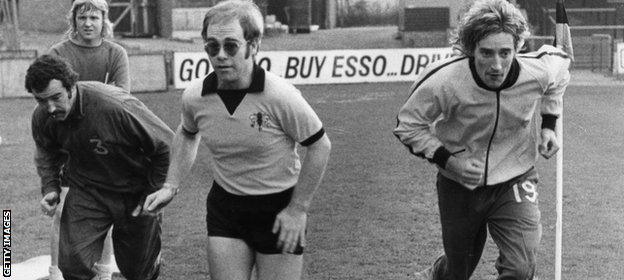
Music and sport have always had close links, none more so than in this training session at Watford in 1973
John, who has sold more than 300 million records during his career, understands that concept of a journey to the top better than most.
He could pick out tunes on the piano at four, won a scholarship to the Royal Academy of Music at 11, performed in pubs at 15 and wrote hit tunes for others at 20. These were necessary steps along the path to success, similar to those taken by future Olympians and Premier League heroes.
"Both music and sport take a lot of hard work and commitment without much recognition along the way, especially at the early stages," he explained.
"It is important in sport as much as music that we give a platform to people who show promise - the impact of that recognition can be huge, it tells them the sacrifices are worth it.
"I also once heard someone say: 'All musicians want to be sports stars and all sports stars want to be musicians.' I think there's an element of truth in that!"
- Published30 October 2015
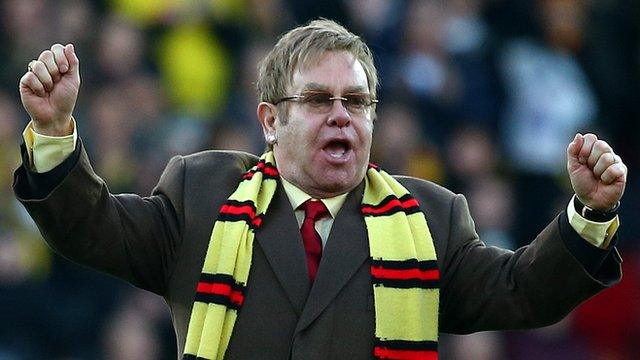
- Attribution
- Published14 December 2014
